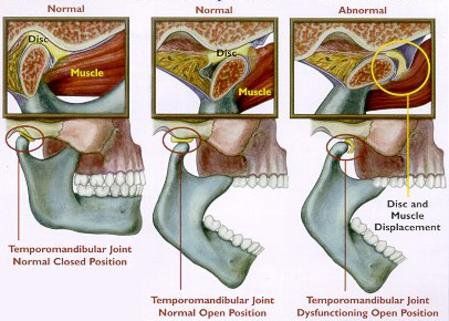Temporomandibular Joint Disorder in Jacksonville, FL
Your jaw is one of the most used joints in your body.
Symptoms for TMD
- Audible cracking or popping when you open your mouth
- Pain when you yawn, chew, or open your mouth wide
- Pain or soreness in the front of your ear, in the jaw muscle, cheek, or in your temples
- Pain or soreness in your teeth
- Difficulty opening your mouth
- Locking of the jaw when you eat, talk, or yawn
- Pain in your face, shoulders and neck
- Limited movement or locking of the jaw
- Grating or clicking when you open your mouth or move your jaw from side to side
- Inability to fit your top and bottom teeth together
- Dizziness, earaches and headaches accompanied by difficulty hearing or swallowing
Causes of TMD
- Myofascial trauma and pain
- Joint dislocation or displaced disc
- Degenerative joint disease caused by rheumatoid arthritis or osteoarthritis in this joint

Myofascial pain and trauma results after people suffer a blow to the head, such as during an accident or while playing sports. The blow could knock the joint out of place and also cause bruising, tears, and over extension of the jaw's tendons and ligaments.
A dislocation or displaced disc likewise could occur because of a blow to the face or an accident. It can also happen during seemingly harmless routines such as visiting with your dentist. If your dentist advises you to keep your mouth open for extended periods of time while he or she works on your teeth, you could inadvertently dislocate your jaw. Many dentists in Jacksonville Florida and elsewhere are mindful of this risk, however, and thus allow patients to close and rest their jaws periodically during treatments.
It was once thought that TMD was the result of stress or overuse of the jaw. However, today doctors in Jacksonville Florida and other places no longer suspect that chewing gum, jaw clicking, and even orthodontic treatments can directly contribute to this condition. However, these factors can cause people to experience stress, which could indirectly impact the safety and usefulness of this joint structure. To prevent stress from putting your jaw at risk in anyway, it may be advisable for you to avoid prolonged gum chewing, purposely clicking your jaw, and other habits that you largely take for granted.
Treatment of Temporomandibular Joint Disorder
If your chiropractor suspects that you have TMD, he or she may diagnose you by conducting a number of different tests. The first test involves you placing three fingers in your mouth while you clamp down on them. Your provider may also listen to your jaw while you open and close your mouth. More thorough tests can range from x-rays to MRIs, which can detect displaced discs and over extensions in your jawline.
Treatments for TMD
- Chiropractic manipulation
- Therapeutic massage
- Ice or heat applications
- Therapeutic exercises for your jaw
- Mouth appliances like mouth / teeth guards to prevent you from clamping your jaw too tightly
Prevention of TMD
- Apply heat and ice to the joint area of the jaw
- Recommended exercises to stretch and strengthen your jaw
- Avoid foods like hard candy, apples, large sandwiches that cause you to open your mouth too wide or chomp down too hard while eating.

